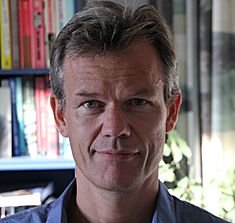News
US firm snaps up Danish biomedical research firm for millions
This article is more than 10 years old.
EpiTherapeutics sold Gilead Sciences for 444 million kroner

Kristian Helin, the CSO of EpiTherapeutics (photo: KU)
EpiTherapeutics, a biomedical research company developed by the University of Copenhagen (KU), has been sold to the US pharmaceutical company Gilead Sciences for 444 million kroner.
The company’s development programs are focused on epigenetics, which involves the regulatory system that controls human genes. The research could prove to be important for the treatment of a number of diseases, particularly cancer.
“We established EpiTherapeutics after we discovered a new protein family in my lab at KU,” said Kristian Helin, the CSO of EpiTherapeutics and a professor at KU.
“It’s given us a unique opportunity to build a bridge between the scientific foundation of cancer research and the development of new medicine. It’s generated new jobs and investment in Denmark.”
READ MORE: Danish researchers make important bowel cancer discovery
Useful for patients and funding
Until now, EpiTherapeutics has been owned by researchers at KU, while investors include Novo Seeds, Lundbeck Fonden Emerge, SEED Capital and Merck Serono Venture.
KU contended that the sale is an example of how biomedical research at the university can be translated into something useful for society – in terms of new medicine and regarding the funding of new research.
“It’s a great day for Danish biomedical research,” stated Martin Bonde, the CEO of EpiTherapeutics.
“With the sale, we have managed to translate and ennoble world-class research from KU into something which will benefit patients at the end of the day.”










































